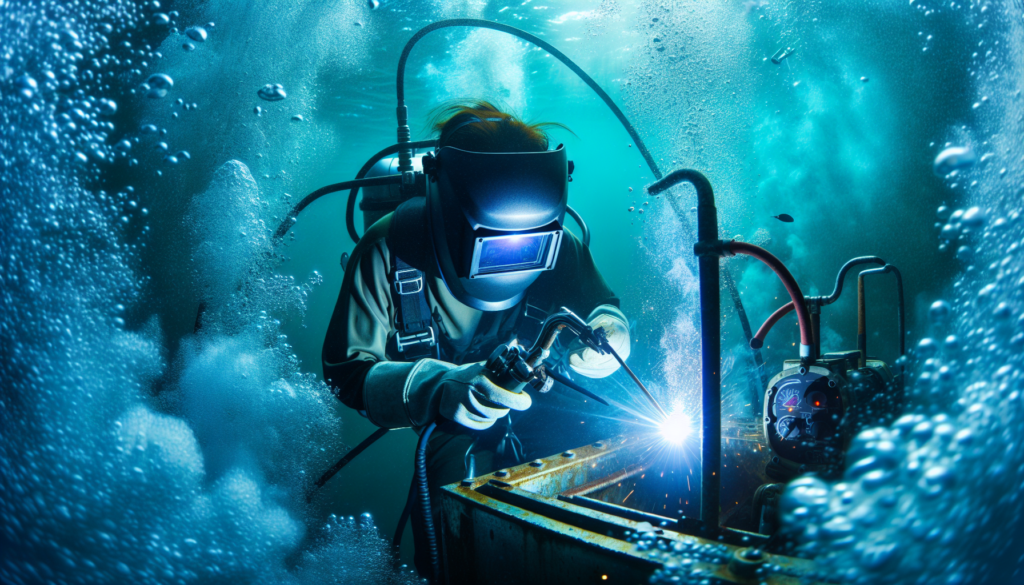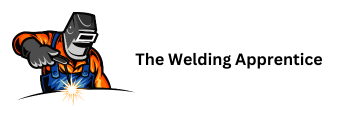Did you know that underwater welding is not only a thrilling and challenging profession, but it can also be quite lucrative? Yes, you heard it right! If you have ever wondered about the potential earnings in this unique field, you’re in for a treat. In this article, we will explore the world of underwater welding pay and uncover the exciting possibilities that await those brave souls who are willing to take the plunge into this dynamic industry. Get ready to be amazed by the rewarding opportunities that lie beneath the surface!

1. Average Pay for Underwater Welders
Underwater welding is a unique and challenging profession that offers exciting opportunities for those with the right skills and training. The pay for underwater welders can vary depending on several factors, such as certifications, experience, industry, and location.
1.1 Factors Affecting Pay
Several factors can influence the pay of underwater welders. One of the primary factors is the level of certification held by the welder. Certain certifications, such as the American Welding Society’s Certified Welding Diver certification, can increase the demand for a welder’s services and potentially command higher pay rates. Additionally, the level of experience also plays a significant role in determining pay. Experienced underwater welders who have a proven track record of successful projects may be able to negotiate higher rates.
1.2 Salary Range
The salary range for underwater welders can vary significantly. On average, an entry-level underwater welder can expect to earn around $25 to $30 per hour. However, experienced underwater welders with advanced certifications can earn significantly more. Top-level professionals with years of experience and multiple certifications can earn upwards of $100,000 per year. It’s important to note that this salary range can vary depending on factors such as geographical location and demand for underwater welders in a particular industry.
1.3 Industry Comparison
The industry in which an underwater welder works can have a significant impact on their pay. Generally, the offshore oil and gas industry tends to offer higher pay rates compared to other sectors. This is primarily due to the demanding nature of offshore work and the high level of skill required. Other sectors that employ underwater welders, such as construction, salvage and repair, and bridge inspections, may offer competitive pay rates depending on the specific project and requirements.
2. Certification and Experience
Obtaining the necessary certifications and gaining experience are crucial steps in establishing a successful career as an underwater welder.
2.1 Certifications Required
Underwater welders are typically required to hold a combination of both diving and welding certifications. Some of the certifications commonly sought after in the industry include:
- Certified Welding Diver (CWD): This certification, offered by the American Welding Society (AWS), is considered the industry standard for underwater welders. It demonstrates a welder’s proficiency in both diving and welding techniques.
- Commercial Diving Certification: Commercial diving certifications, such as those offered by the Association of Diving Contractors International (ADCI), are required to ensure divers have the necessary skills and knowledge to work safely underwater.
- Welding Certifications: Underwater welders must also hold various welding certifications, such as those offered by the AWS or other recognized bodies. These certifications validate the welder’s expertise in different welding processes and ensure the quality of their work.
2.2 Effect of Experience on Pay
Experience plays a crucial role in an underwater welder’s pay scale. As welders gain more experience and develop a reputation for their skills, they can command higher pay rates. Experience not only enhances a welder’s proficiency in the craft but also allows them to handle more challenging and complex projects. Employers often value experienced underwater welders who can work independently, effectively manage risks, and consistently deliver high-quality results.
3. Pros and Cons of Underwater Welding Pay
Before diving into a career in underwater welding, it’s essential to consider both the advantages and disadvantages of the profession.
3.1 Advantages of Underwater Welding Pay
One significant advantage of underwater welding pay is the potential for high earnings. Experienced underwater welders with in-demand certifications can earn considerably higher wages compared to other welding professions. This can provide financial stability and open doors for future career growth. Additionally, the nature of underwater welding work is often project-based, allowing divers to take on different assignments and work in various locations, adding excitement and variety to their careers.
3.2 Disadvantages of Underwater Welding Pay
Underwater welding also comes with its fair share of challenges. Firstly, the job can be physically demanding and mentally exhausting. Working in hazardous environments with limited visibility adds an extra layer of difficulty to the welding process. Moreover, underwater welders often have to work long hours and face strict deadlines, which can be physically and mentally taxing. Additionally, the nature of the job may require being away from friends and family for extended periods.
4. Job Opportunities and Locations
Underwater welders can find employment opportunities in various sectors, and the demand for their services can vary based on industry and location.
4.1 Sectors Hiring Underwater Welders
Several sectors hire underwater welders for a variety of projects. The offshore oil and gas industry offers numerous opportunities for underwater welders, as they play a crucial role in maintaining and repairing offshore structures. Other sectors that employ underwater welders include shipping and maritime, construction, salvage and repair, and bridge inspections. Each sector presents unique challenges and opportunities for those seeking a career in underwater welding.
4.2 Demand in Specific Locations
The demand for underwater welders can vary depending on geographical location. Coastal areas with a significant presence of offshore structures, such as oil rigs or wind farms, often have higher demand for underwater welders. Regions with active construction projects, port facilities, or bridge maintenance also offer potential job opportunities. It’s worth noting that competition for jobs can be intense in certain locations, while others may have a higher demand than available skilled underwater welders.

5. Additional Benefits and Perks
Apart from the base pay, underwater welders may also have access to additional benefits and perks that can enhance their overall compensation package. These benefits can vary depending on the employer and specific project requirements.
5.1 Housing Allowance
In certain cases, employers may provide a housing allowance to underwater welders working on long-term projects away from their usual place of residence. This allowance can cover accommodation expenses, making it easier for divers to focus on their work rather than worrying about finding suitable housing in unfamiliar locations.
5.2 Travel Allowance
Travel allowances are another common perk for underwater welders. Since projects can be located in different cities or even countries, employers may provide financial assistance to cover transportation costs. This helps divers to commute to and from the job site without incurring significant expenses.
5.3 Diving Equipment and Tools
Underwater welders often require specialized diving equipment and welding tools to perform their work efficiently and safely. Some employers may provide this equipment or offer a stipend to help offset the cost of purchasing and maintaining their gear. This benefit not only reduces the financial burden on the welder but also ensures they have access to proper equipment that meets industry standards.
5.4 Health and Life Insurance
Due to the nature of the job, underwater welders face certain risks and hazards. Employers may provide health and life insurance coverage to ensure the well-being of their employees. This coverage can provide peace of mind to underwater welders and their families, knowing that they are protected in the event of an accident or injury.
6. Risks and Challenges
While underwater welding can be a lucrative profession, it is not without its risks and challenges. It’s important to be aware of these potential hazards and make an informed decision before pursuing a career in underwater welding.
6.1 Hazards of Underwater Welding
Underwater welding is categorized as a high-risk profession due to the inherent dangers associated with working in underwater environments. Some of the hazards that underwater welders face include electric shock, hypothermia, drowning, and injury from underwater equipment. The limited visibility and increased water pressure can further complicate the welding process, making it essential for welders to undergo proper training and follow strict safety protocols.
6.2 Physical and Mental Demands
Underwater welding requires a high level of physical fitness and stamina. Divers must be able to navigate challenging underwater conditions, carry heavy equipment, and work in confined spaces for extended periods. Additionally, the mental demands of the job should not be overlooked. Underwater welders need to remain calm and focused in potentially stressful situations, making split-second decisions that impact their safety and the success of the project.
7. Tips to Maximize Underwater Welding Pay
There are several strategies underwater welders can employ to maximize their earning potential and secure better pay rates.
7.1 Obtain Advanced Certifications
Continuing education and obtaining advanced certifications can significantly enhance an underwater welder’s earning potential. By acquiring specialized certifications in welding techniques or gaining expertise in specific types of projects, divers can position themselves as highly skilled professionals, which often translates to higher pay rates.
7.2 Gain Diverse Welding Experience
By diversifying their experience, welders can expand their skill set and increase their marketability. Working on a wide range of projects, from offshore oil rigs to bridge inspections, allows underwater welders to develop expertise in different sectors. This versatility can make the welder more attractive to employers and potentially lead to higher-paying job opportunities.
7.3 Network and Establish Connections
Building a strong professional network is crucial for career growth in underwater welding. Attending industry conferences, joining relevant associations, and actively networking with other professionals can lead to valuable connections and potential job opportunities. By establishing relationships with industry veterans and decision-makers, welders increase their chances of securing higher-paying assignments.
7.4 Negotiate Contracts and Rates
Underwater welders should not hesitate to negotiate their contracts and pay rates. Utilizing their certifications, experience, and network, divers can advocate for fair compensation that reflects their skills and the level of risk involved in their work. Negotiating contracts and rates allows underwater welders to secure better pay and benefits, ultimately contributing to their overall financial success.
8. Salary Growth and Career Advancement
Underwater welding offers opportunities for salary growth and career advancement for those willing to invest in their professional development.
8.1 Opportunities for Career Progression
With experience and additional certifications, underwater welders can progress in their careers and take on more senior roles. By demonstrating expertise in particular welding techniques or exhibiting strong leadership skills, welders can move into supervisory or management positions. Such advancements often come with increased responsibility and higher pay.
8.2 Further Education and Specialization
To unlock further career growth potential, underwater welders can pursue further education and specialization. Whether it’s obtaining an engineering degree or focusing on a particular niche, such as underwater pipeline welding, continued education can open doors to higher-paying positions and more challenging projects. Staying up-to-date with emerging technologies and industry trends is critical for career advancement in the ever-evolving field of underwater welding.
9. Future Outlook for Underwater Welding Pay
The future outlook for underwater welding pay is promising as emerging technologies and industries continue to drive demand for skilled welders.
9.1 Emerging Technologies and Industries
As technology advances, new opportunities for underwater welders are emerging. The expansion of renewable energy sources, such as offshore wind farms, has created a demand for underwater welders to construct and maintain these structures. Additionally, advancements in autonomous underwater vehicles (AUVs) and remotely operated vehicles (ROVs) are also opening doors for underwater welders to work on innovative projects and potentially command higher pay rates.
9.2 Anticipated Changes in Pay Scale
While the pay scale for underwater welders can vary, overall trends indicate that the demand for skilled professionals will continue to drive wages upwards. As the global economy expands and infrastructure development projects increase, the need for underwater maintenance, repair, and construction will grow accordingly. This anticipated increase in demand will likely lead to higher pay rates, making underwater welding an even more attractive career choice for those seeking financial stability and exciting challenges.
In conclusion, the pay for underwater welders can vary based on various factors such as certifications, experience, industry, and location. While the profession offers the potential for high earnings and unique opportunities, it is not without its risks and challenges. With the right certifications, experience, and strategies, underwater welders can maximize their pay and create a successful career in this specialized field. As the industry continues to evolve, the future outlook for underwater welding pay remains promising, making it an enticing choice for those passionate about welding and intrigued by the underwater environment.
